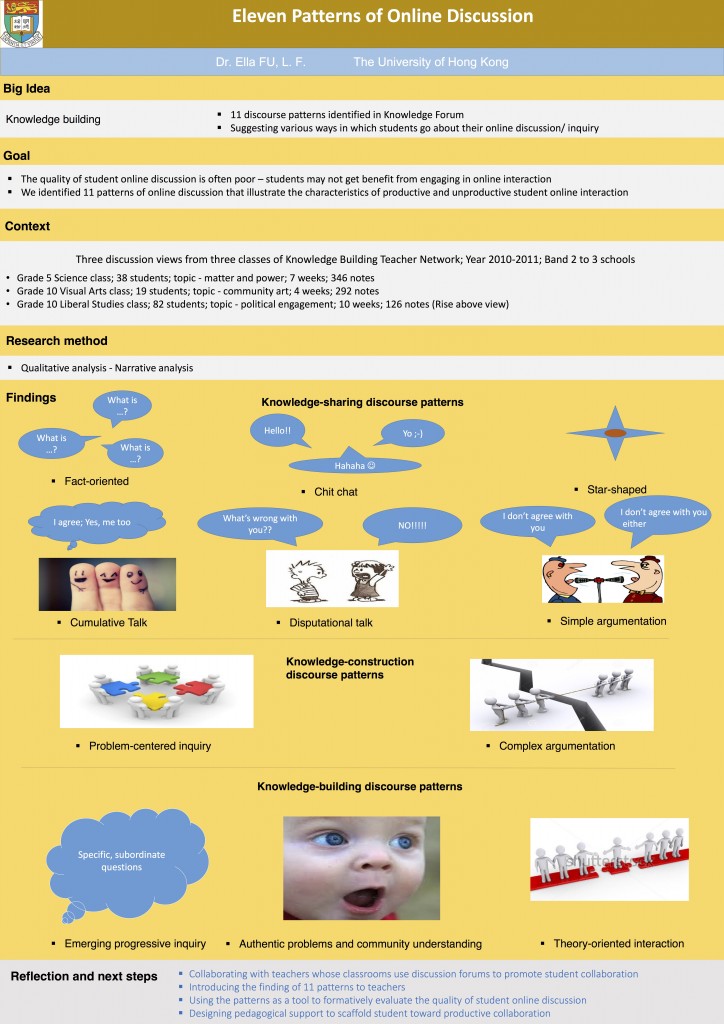Author: Yuqin Yang and Bing Fai Lee
Goal: To investigate whether students with low prior academic achievement were able to collectively improve their online discourse in a knowledge-building environment using an assessment tool, the Knowledge Connections Analyzer (KCA).
Author: Dr. Ella Fu, L. F.
Goal: To identify patterns of online discussion that illustrate the characteristics of productive and unproductive student online discussion.
Symmetrical Knowledge Advances: Researcher-Teacher Collaboration on Designing Assessment for Knowledge-Building Innovation
Prof. Carol Chan & Dr. Eddy Lee
Abstract
This study reported on how teacher-researcher collaboration has led to the development of an assessment approach for characterizing and scaffolding collaborative knowledge building (KB). Starting from a graduate course to secondary school classrooms, and spreading to a teacher network, researchers and teachers worked together in designing and examining an assessment approach that reflects and characterizes the collective nature of knowledge building. Across different iterations, reflective assessment, that involves students assessing their own knowledge advances, demonstrated benefits for student inquiry and domain understanding. We also reported how the assessment approach has been adapted by other teachers that helped to sustain KB practice in schools and bring about new research agenda on assessment for knowledge building.
Introduction
- A major research theme of computer-supported collaborative learning (CSCL) examines the nature and interaction of individual and collective knowledge. Much progress has been made with a focus on how researchers analyze and develop tools to support collaboration.
- At the classroom level, how can CSCL assessments be designed to examine both individual and collective learning as well as to scaffold collaboration? How can assessment be developed as an approach to foster teachers and students’ understanding of knowledge building?
Perspectives
- The knowledge-creation perspective, mediated by Knowledge Forum (KF), a forerunner of CSCL, focused on collective knowledge advances– Ideas are viewed as conceptual artifacts that can be improved through progressive discourse (Scardamalia & Bereiter, 1994; 2006).
- Our previous reearch has considered the role of assessment in CSCL and designed a portfolio assessment approach that characterize and foster collective knowledge building (Chan & van Aalst, 2004; van Aalst and Chan, 2007).
- This study documents the evolution of the assessment design to illustrate researcher-teacher collaboration and symmetrical advances, and to describe further development on assessment in the context of the teacher community.
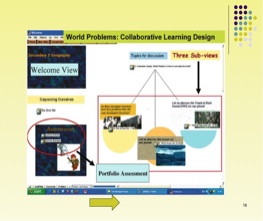
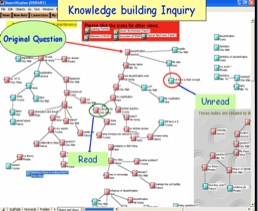
Development of Knowledge-Building Assessments
Phase One: Initial Design of Portfolios in a Graduate Course by Researchers
- Iteration One: To develop portfolio with principles for characterizing KB (Graduate Course). The assessment design using e-portfolios was first developed in a graduate course. Students were asked to identify examples of knowledge building using a set of kb principles. (Chan & van Aalst, 2006; van Aalst & Chan, 2007). Student responses suggest the role of kb portfolios not only to characterize collaboration but also to scaffold understanding.
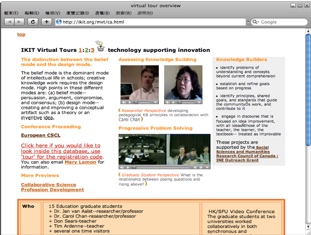
A virtual tour on assessment of knowledge building
Phase Two: Teacher-Researcher Collaboration in Developing KB Assessment Portfolios
- Iteration Two: To design portfolios for characterizing and scaffolding KB (Form Six, aged 16-17). A graduate student (teacher) from the course refined the design — From asking students to identify their own best work, we asked students to identify the best work of the community on knowledge building (van Aalst & Chan, 2007).
- Iteration Three: To examine the role of kb principles in portfolios (Form Three, aged 13-14) The portfolio design was examined among younger students in bigger classes with positive results for scaffolding roles of KB principles (Lee, Chan & van Aalst, 2006)
- Iteration Four: To examine the role of kb portfolio for high- and low-achievers (Form Three, aged 13-14). KB portfolios were further examined suggesting that principles can help low achievers (Chan, Lee, & van Aalst, 2007).
- Iteration Five: To examine reflective assessment on conceptual change (Form Four, aged 14-15)
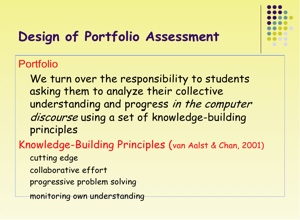
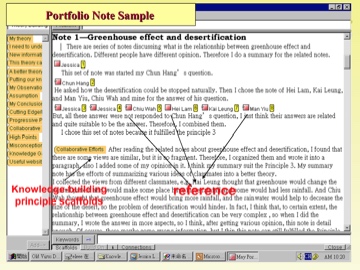
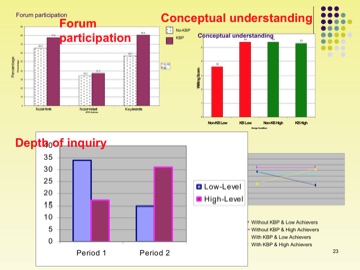
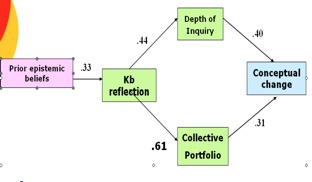
Phase Three: Examining Assessment as a Design for Teachers’ Knowledge Building
- Assessment Practice Adopted by Other Teachers: This assessment approach, developed by a key teacher in the teacher community, was taken up and adopted in different forms by other teachers, for example, Rise-Above reflection and summary note with “references”. Teachers found that helpful for students to synthesize fragmented notes and to reflect on their individual and collective learning.
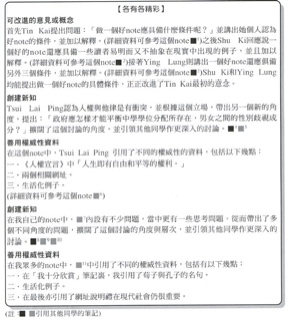
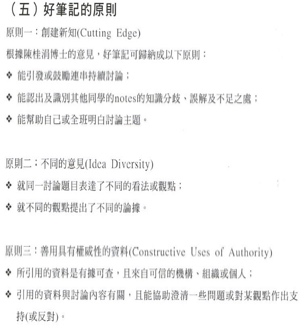
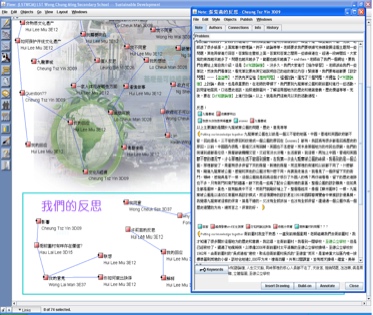
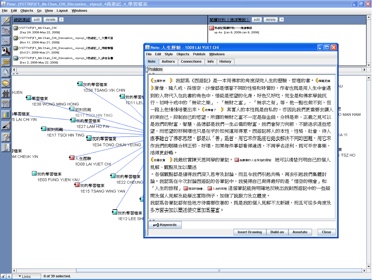
- Widening of Assessment Practices. Technology-enhanced assessment tools were not only used by researchers; they were employed by teachers for formative assessment of students’ knowledge-building and teachers’ professional development.
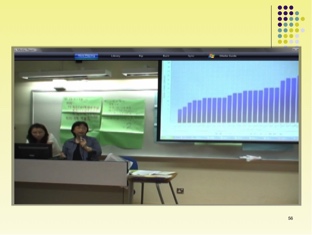
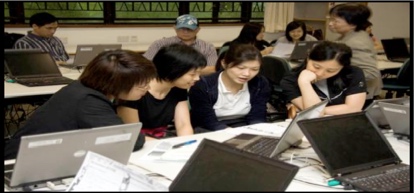
- Examining Assessment as a Design Principle for Teacher Professional Development. Ongoing design work in the teacher community is conducted to examine how teachers can be supported to use knowledge-building assessment supported with technology. We will examine whether and how teachers engaging in more assessment would change towards better kb practice with more growth for their students.
Conclusions
- Designing and examining CSCL and knowledge-building assessment in classrooms provided opportunities for symmetrical knowledge advances. Portfolio designs illustrate the emergent nature of collective knowledge for theorizing of knowledge building. The portfolios provided a tool for teachers to understand and scaffold students’ collaboration in classrooms.
- Further investigation into how CSCL assessments work would advance our understanding about theory and design for collaboration.

